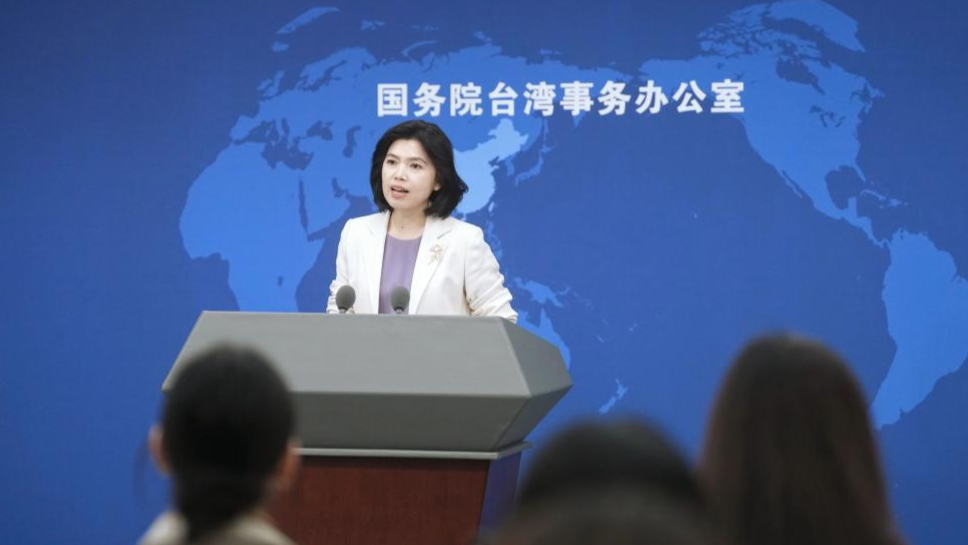
BEIJING - The mainland welcomes compatriots from both sides of the Taiwan Strait to provide clues on illegal activities of 18 core members of the Taiwan military's "psychological warfare unit," a spokesperson said on Wednesday.
Zhu Fenglian, a spokesperson for the State Council Taiwan Affairs Office, made the remarks in response to a media query regarding a recent bounty notice issued by police in Xiamen, Fujian province, for such clues.
It is hoped that compatriots on both sides of the Taiwan Strait will actively provide clues, firmly oppose any form of "Taiwan independence" separatist acts, and be resolutely committed to safeguarding national unification, Zhu told reporters.
The mainland public security authorities' move represents a concrete action to implement a central government document on punishing "Taiwan independence" separatist forces and a just move to safeguard the common interests of compatriots on both sides of the Taiwan Strait and the fundamental interests of the Chinese nation, Zhu said.
ALSO READ: Beijing: Maintaining 'diplomatic ties' with Taiwan authorities will lead nowhere
Taiwan is part of China, Zhu noted, adding that anyone who endangers the country's sovereignty, security, and development interests will not escape the punishment of national laws.
The Democratic Progressive Party (DPP) authorities in Taiwan have manipulated the "psychological warfare unit" to smear and attack the mainland, spread the fallacy of "Taiwan independence," and incite separatist activities against the country.
"The facts are clear, and the evidence is conclusive," said the spokesperson.
Recently, mainland media named five Taiwan enterprises as supporters for the "psychological warfare unit." The DPP authorities claimed that the mainland is attempting to "intimidate" Taiwan businesses.
READ MORE: Mainland urges Taiwan people to reject Lai's secessionist remarks
In response, Zhu said the mainland's lawful crackdown on such illegal activities is a just and necessary move to safeguard national security and the legitimate rights and interests of the people and enterprises.
To resist external challenge with scross-Strait joint efforts
Regarding the difficulties faced by TSMC's factory in the United States, Zhu called for enhanced cross-Strait cooperation in AI and other cutting-edge fields, and criticized Taiwan's Democratic Progressive Party (DPP) authorities for "sacrificing" the island's competitive industries for their own political gains.
There were also public opinions in Taiwan suggesting that both sides of the Taiwan Strait should collaborate in high-tech industries, expand investment, and reduce reliance on the US, Zhu said.
She said that the mainland's high-tech sector is rapidly advancing, with new industries and business models continually emerging, providing a solid foundation and broad space for relevant cooperation. Taiwan's semiconductor industry, a competitive sector on the island, could have tapped into strengthened cross-Strait cooperation to realize better development.
However, the DPP authorities have treated it as a bargaining chip to seek their own political benefits, selling out the industry to rely on the US, Zhu said, adding that the move is unpopular among the people.
She said Taiwan should work together with the mainland, deepen cross-Strait integrated development, and jointly resist external risks and challenges.
Opposing US arms sales to Taiwan
In addition, Zhu stated the country's firm opposition to the US arms sales to China's Taiwan region. "We have always, clearly and resolutely opposed US arms sales to China's Taiwan region," Zhu said.
Zhu warned that the DPP authorities had squandered funds that could have been used to improve livelihoods on the island in order to curry favor with external forces, which would bring grave disaster to Taiwan compatriots.
She reiterated that the Taiwan question is purely China's internal affair and brooks no external interference.
Zhu criticized some people in the US for treating Taiwan as a pawn for their political and economic interests, and urged the US to adhere to the one-China principle and the three China-US joint communiques.


